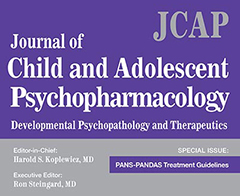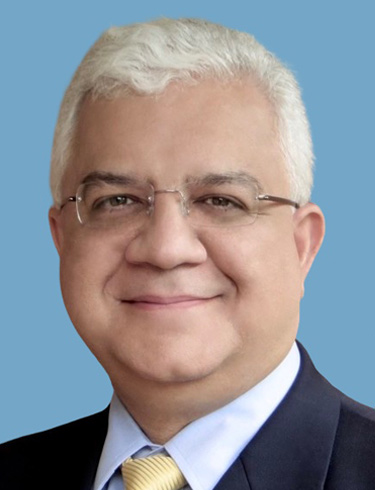
In July 2017, the Journal of Child and Adolescent Psychopharmacology (JCAP) published a revised set of treatment guidelines for Pediatric Acute-Onset Neuropsychiatric Syndrome (PANS) and Pediatric Autoimmune Neuropsychiatric Disorder Associated with Streptococcal infection (PANDAS). The treatment recommendations, developed by a panel of leading clinicians and researchers, focus on three areas:
Links to individual articles in this special edition are listed below.
Thienemann Margo, Murphy Tanya, Leckman James, Shaw Richard, Williams Kyle, Kapphahn Cynthia, Frankovich Jennifer, Geller Daniel, Bernstein Gail, Chang Kiki, Elia Josephine, and Swedo Susan.
ABSTRACT
Objective: This article outlines the consensus guidelines for symptomatic treatment for children with Pediatric Acute-Onset Neuropsychiatric Syndrome (PANS) and Pediatric Autoimmune Neuropsychiatric Syndrome Associated with Streptococcal infection (PANDAS).
Methods: Extant literature on behavioral, psychotherapeutic, and psychopharmacologic treatments for PANS and PANDAS was reviewed. Members of the PANS Research Consortium pooled their clinical experiences to find agreement on treatment of PANS and PANDAS symptoms.
Results: Current guidelines result from consensus among the Consortium members.
Conclusions: While underlying infectious and inflammatory processes in PANS and PANDAS patients are treated, psychiatric and behavioral symptoms need simultaneous treatment to decrease suffering and improve adherence to therapeutic intervention. Psychological, behavioral, and psychopharmacologic interventions tailored to each child’s presentation can provide symptom improvement and improve functioning during both the acute and chronic stages of illness. In general, typical evidence-based interventions are appropriate for the varied symptoms of PANS and PANDAS. Individual differences in expected response to psychotropic medication may require marked reduction of initial treatment dose. Antimicrobials and immunomodulatory therapies may be indicated, as discussed in Parts 2 and 3 of this guideline series.
Frankovich Jennifer, Swedo Susan, Murphy Tanya, Dale Russell C., Agalliu Dritan, Williams Kyle, Daines Michael, Hornig Mady, Chugani Harry, Sanger Terence, Muscal Eyal, Pasternack Mark, Cooperstock Michael, Gans Hayley, Zhang Yujuan, Cunningham Madeleine, Bernstein Gail, Bromberg Reuven, Willett Theresa, Brown Kayla, Farhadian Bahare, Chang Kiki, Geller Daniel, Hernandez Joseph, Sherr Janell, Shaw Richard, Latimer Elizabeth, Leckman James, Thienemann Margo, and PANS/PANDAS Consortium.
ABSTRACT
Introduction: Pediatric Acute-Onset Neuropsychiatric Syndrome (PANS) is a clinically heterogeneous disorder with a number of different etiologies and disease mechanisms. Inflammatory and postinfectious autoimmune presentations of PANS occur frequently, with some clinical series documenting immune abnormalities in 75%–80% of patients. Thus, comprehensive treatment protocols must include immunological interventions, but their use should be reserved only for PANS cases in which the symptoms represent underlying neuroinflammation or postinfectious autoimmunity, as seen in the PANDAS subgroup (Pediatric Autoimmune Neuropsychiatric Disorders Associated with Streptococcal infections).
Methods: The PANS Research Consortium (PRC) immunomodulatory task force is comprised of immunologists, rheumatologists, neurologists, infectious disease experts, general pediatricians, psychiatrists, nurse practitioners, and basic scientists with expertise in neuroimmunology and PANS-related animal models. Preliminary treatment guidelines were created in the Spring of 2014 at the National Institute of Health and refined over the ensuing 2 years over conference calls and a shared web-based document. Seven pediatric mental health practitioners, with expertise in diagnosing and monitoring patients with PANS, were consulted to create categories in disease severity and critically review final recommendations. All authors played a role in creating these guidelines. The views of all authors were incorporated and all authors gave final approval of these guidelines.
Results: Separate guidelines were created for the use of immunomodulatory therapies in PANS patients with (1) mild, (2) moderate-to-severe, and (3) extreme/life-threatening severity. For mildly impairing PANS, the most appropriate therapy may be “tincture of time” combined with cognitive behavioral therapy and other supportive therapies. If symptoms persist, nonsteroidal anti-inflammatory drugs and/or short oral corticosteroid bursts are recommended. For moderate-to-severe PANS, oral or intravenous corticosteroids may be sufficient. However, intravenous immunoglobulin (IVIG) is often the preferred treatment for these patients by most PRC members. For more severe or chronic presentations, prolonged corticosteroid courses (with taper) or repeated high-dose corticosteroids may be indicated. For PANS with extreme and life-threatening impairment, therapeutic plasma exchange is the first-line therapy given either alone or in combination with IVIG, high-dose intravenous corticosteroids, and/or rituximab.
Conclusions: These recommendations will help guide the use of anti-inflammatory and immunomodulatory therapy in the treatment of PANS.
Cooperstock Michael S., Swedo Susan E., Pasternack Mark S., Murphy Tanya K., and for the PANS/PANDAS Consortium.
ABSTRACT
Objective: Pediatric Acute-Onset Neuropsychiatric Syndrome (PANS) and its subset, Pediatric Autoimmune Neuropsychiatric Disorder Associated with Streptococcal infection (PANDAS), are emerging autoimmune encephalopathies of childhood. Management guidelines are needed. This article, from the PANS/PANDAS Consortium, presents a consensus management guideline for the infection components. Accompanying papers from the Consortium discuss psychiatric and immunomodulatory management.
Method: Literature was reviewed and integrated with the clinical experience of the authors to provide a set of practical guidelines. This article was submitted to all members of the PANS/PANDAS Consortium, and their additional comments were added.
Results: The relationships between PANS and infections are reviewed. An approach to the retrospective diagnosis of group A streptococcal infection for an operational definition of PANDAS is proposed. An initial course of anti-streptococcal treatment is proposed for all newly diagnosed PANS cases. Chronic secondary antimicrobial prophylaxis is suggested for children with PANDAS who have severe neuropsychiatric symptoms or recurrent group A Streptococcus-associated exacerbations. Guidelines for children with non-streptococcal PANS include vigilance for streptococcal pharyngitis or dermatitis in the patient and close contacts. All patients with PANS or PANDAS should also be closely monitored for other intercurrent infections, including sinusitis and influenza. Intercurrent infections should be diagnosed and treated promptly according to current standard guidelines. A guideline for the assessment of infection at initial onset or during neuropsychiatric exacerbations is also presented. Standard immunizations and attention to vitamin D are encouraged. Data indicating limited utility of adenotonsillectomy and probiotics are presented.
Conclusions: A working guideline for the management of infection issues in PANS and PANDAS, based on literature and expert opinion, is provided.
For more information on PANS/PANDAS treatment recommendations, visit PANDAS Physicians Network.





